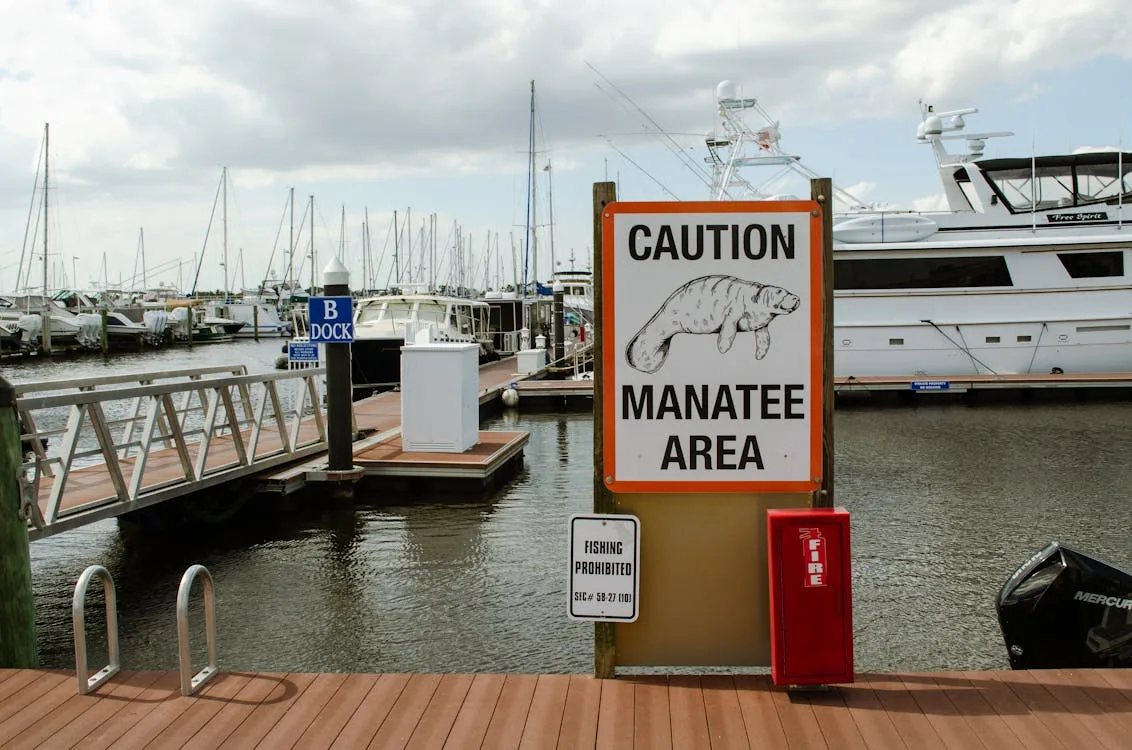From Fins to Fines: The Legal Consequences of Manatee Contact
Image source: Pexels.com
Ever imagine going swimming with manatees? Among the most remarkable animals in the ocean are these gentle giants. They are charming, lively, and serene. However, did you realize that you might break the law by touching a manatee?
In this blog post, I’ll go over the reasons behind the legal protection of manatees, the legal ramifications of coming into touch with them, and legal ways to enjoy manatees without hurting them or disobeying the law.
Why do laws protect manatees?
Manatees are in danger of being extinct.
Marine animals that are members of the Sirenia order include manatees. This also features the endangered Steller’s sea cow and dugongs. The West Indian manatee, West African manatee, and Amazonian manatee are the three species of manatees. The only species found in the United States is the West Indian manatee.
As herbivores, manatees consume seagrass and other aquatic vegetation for sustenance. They have a maximum length of 15 feet and a maximum weight of 3,900 pounds. They feature two flippers, a round tail, and a whiskered, wrinkly face. They are quite gregarious and frequently organize into small groups.
Additionally, manatees are extremely susceptible to environmental and human dangers. They move slowly and frequently hover close to the water’s surface. It makes them simple pickings for habitat loss, fishing gear entanglements, and boat strikes. In addition, they experience illnesses, red tide, and chilly stress. The International Union for Conservation of Nature has classified manatees as vulnerable to extinction as a result of several factors (IUCN).
Several laws provide protection for manatees.
At the federal and state levels, a number of legislation have been passed to prevent manatees from declining any further. The Florida Manatee Sanctuary Act of 1978, the Marine Mammal Protection Act of 1972, and the Endangered Species Act of 1973 all provide protection for manatees. Feeding, harassing, harming, pursuing, hunting, shooting, wounding, killing, annoying, or molesting manatees is prohibited by these laws.
What legal repercussions can manatee contact cause?
Any activity that tampers or disrupts a manatee’s natural behavior is considered manatee contact.
Any action that tampers with a manatee’s normal behavior is considered manatee contact. This comprises:
Providing manatees with food or water, or luring them in with food or water
separating a calf from its mother
Unsettling mating herds of manatees
Swimming or using a vessel to chase or pursue manatees
upsetting manatees who are asleep
Manatee-related behaviors include striking, leaping, standing, gripping, and trying to ride them.
impeding a manatee’s migration
fishing or making an attempt to capture a manatee
Contact with manatees is illegal and may be harmful to the animals.
The Manatee Sanctuary Act prohibits manatee interaction and imposes fines of up to $500 and/or jail terms of up to 60 days. However, you might face up to a year in jail and/or a $50,000 fine under the Federal Protection Laws if you mistreat or harass the animal or if your actions cause it to get hurt or die.
Manatee interaction can have detrimental effects on the animals themselves in addition to the legal ramifications. When a manatee feels threatened, it may leave warm waters and develop cold-stress syndrome, which in severe situations can be fatal.
How can you take pleasure in manatees without endangering them or breaching the law?
Observe the manatee viewing guidelines.
Manatees are interesting, exquisite creatures that are deserving of our respect and appreciation. By adhering to these rules, you can still enjoy them without endangering them or infringing the law:
Keep a minimum distance of 50 feet when observing manatees.
Avoid feeding, watering, or touching manatees.
Avoid pursuing, encircling, or chasing manatees.
Avoid upsetting manatees who are sleeping or mating.
A manatee’s access to food, water, and shelter should not be restricted.
When seeing manatees, use a snorkel and mask rather than scuba equipment.
If you don’t want to shiver and get cold, which can frighten manatees, wear a wetsuit.
Steer clear of loud splashing.
In manatee zones, abide by the posted speed limits and signage.
Use a jet drive or a propeller guard to lessen the possibility of manatee injuries.
Call the Florida Fish and Wildlife Conservation Commission at 1-888-404-FWCC to report any manatees that are sick, injured, or dead.
By abiding by these rules, you may both contribute to the preservation of manatees and their habitat and have a civilized and unforgettable interaction with these incredible creatures.
In conclusion
Due to their vulnerability to extinction and the numerous risks they face from both the environment and humans, manatees are protected by legislation. It’s forbidden to touch manatees and doing so can have negative legal and environmental repercussions. By keeping your distance and abiding by the viewing restrictions, you can enjoy manatees without endangering them or breaking the law. As natural treasures, manatees deserve our utmost protection so that future generations can enjoy them.





0